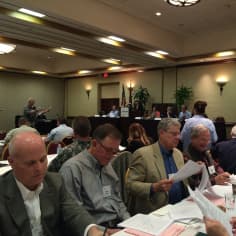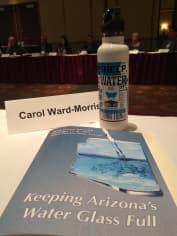AMWUA Blog
BY: Kathleen FerrisArizona Town Hall: A Unique Process for Addressing Important Arizona Issues

Last month, the 107th Arizona Town Hall was held in Mesa, Arizona. Arizona Town Hall is a non-profit organization that brings together diverse Arizonans to discuss critical state issues facing the state and make recommendations for progress. It's been doing that for over 50 years. Underscoring the importance of water in our arid state, the 107th Arizona Town Hall marked the 6th such gathering on water in as many decades.
The group assembled in Mesa was indeed diverse— lawyers and farmers, ranchers and miners, educators and lobbyists, conservationists and government officials, students and retirees. We were divided into 6 panels where, for two and one half days, we discussed and debated many provocative questions, such as:
- How well has Arizona managed the use of water?
- What are the greatest challenges for ensuring Arizona has the water it needs for the future?
- How do water use and supply impact Arizona’s economy?
- What actions would increase, diversify or stabilize funding to meet Arizona’s future water needs?
- What actions should be taken that would have the most beneficial impact on Arizona’s water needs?
Guided in each panel by a seasoned chairperson, the discussions were educational, collegial and challenging. Colored pipe cleaners were provided to keep fingers busy while minds stayed engaged. A recorder in each panel diligently documented the conversations then spent the evenings with fellow recorders crafting a draft report.

On the final day, the panels convened together to offer changes to the draft report. Participants lined up at microphones to suggest their changes, which were greeted either by raucous yeas or boos from the crowd. Arizona Town Hall Board Chair, Linda Elliott Nelson, maintained order and ruled on the whether the change would be made based on participant reaction. In some cases, two or more participants were sent out of the room to reach a compromise on wording.
Miraculously, consensus emerged on six top priorities the state should pursue:
1. Move forward with the Arizona’s Strategic Vision for Water Supply Sustainability. Drafted by the Arizona Department of Water Resources, the Strategic Vision is a framework for developing strategies to address potential imbalances between water supplies and demands for the next 100 years. It builds on the state's decades of success in planning and investing for its water future. Recognizing that water supplies and uses are not the same statewide , the Strategic Vision divides the state into 22 regional planning areas in order to address localized issues. As directed by Governor Ducey, the Department is prioritizing the planning areas to be considered first.
2. Appropriately fund and staff the Arizona Department of Water Resources. As long reported here , the Department has been underfunded in recent years. It has lost critical employees and cannot compete with other entities salary-wise to retain highly skilled professionals. As the Town Hall participants stated, “Funding will need to be appropriated by the Arizona legislature sufficient to support ADWR’s mission.” This mission includes managing the state’s surface water (river and streams) and groundwater, and protecting Arizona’s Colorado River supplies.
3. Create and Fund Mechanisms to Finance Water Supply and New Infrastructure. The legislature established the Arizona Water Supply Development Revolving Fund several years ago to offer low-interest loans for water supply projects. Unfortunately, the critical step of putting money in the Fund has not occurred. Financing will be necessary to carry out Arizona’s long-term water strategy and funding the Revolving Fund is a good place to start.
4. Education and Public Awareness. Participants agreed that we need to educate the general public and our political leaders on water issues. They further concurred that Arizona “should also develop a focused communication plan and retain staff to lead statewide discussions among the community and water stakeholders.”
5. Conservation and Augmentation. Continuing conservation of existing water supplies and future augmentation of our water supplies are both needed to ensure adequate water for the future. Town Hall participants noted that Arizona should explore opportunities to expand the use of treated wastewater, called reclaimed water, and improve the management of watersheds, including implementing sustainable forest management programs .
6. Legal Reform. Unfortunately, many water issues do not resolve themselves. We need the legislature and government agencies to help. Participants agreed that Arizona should streamline and simplify the process for resolving water rights claims; allow greater reuse of reclaimed water, including for direct potable use; and allow new groundwater management strategies in rural areas to reduce the depletion of this non-renewable supply.
These are significant recommendations that merit our elected officials’ and our citizens’ attention.
The 107th Arizona Town Hall Report can be found here .
For 46 years, Arizona Municipal Water Users Association has worked to protect our member cities’ ability to provide assured, safe and sustainable water supplies to their communities. For more water information visit www.amwua.org .
